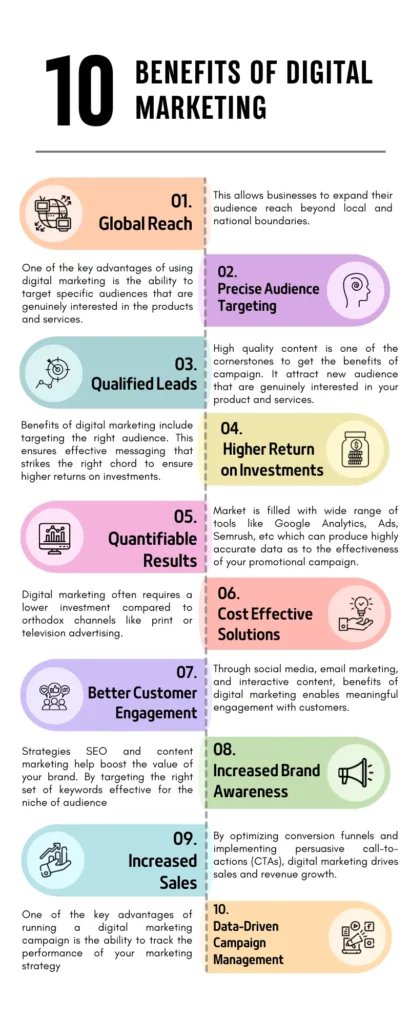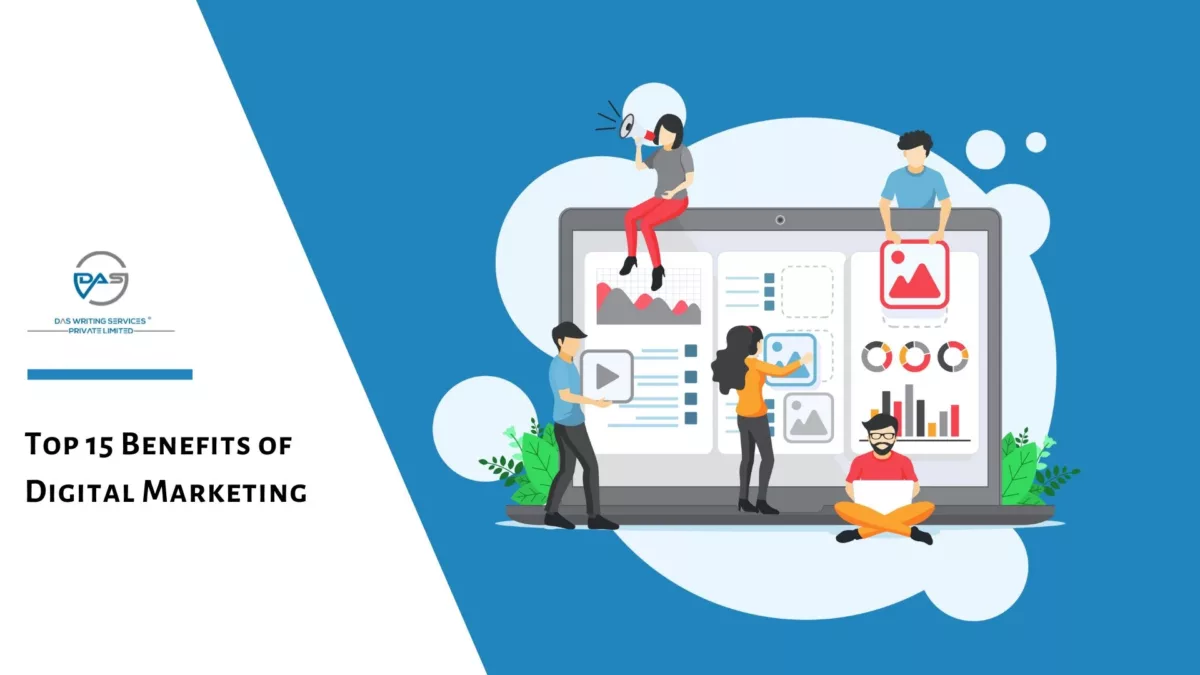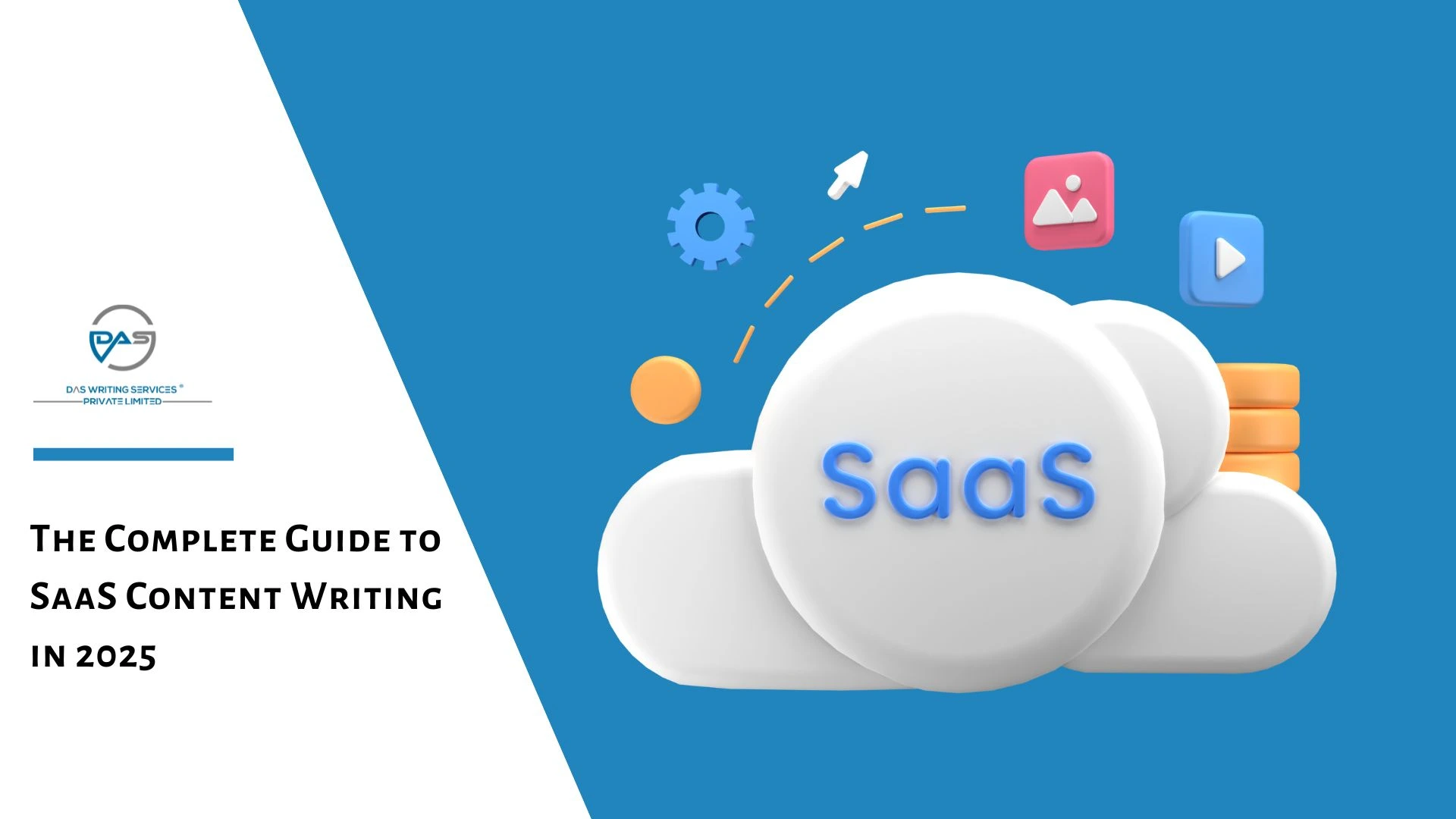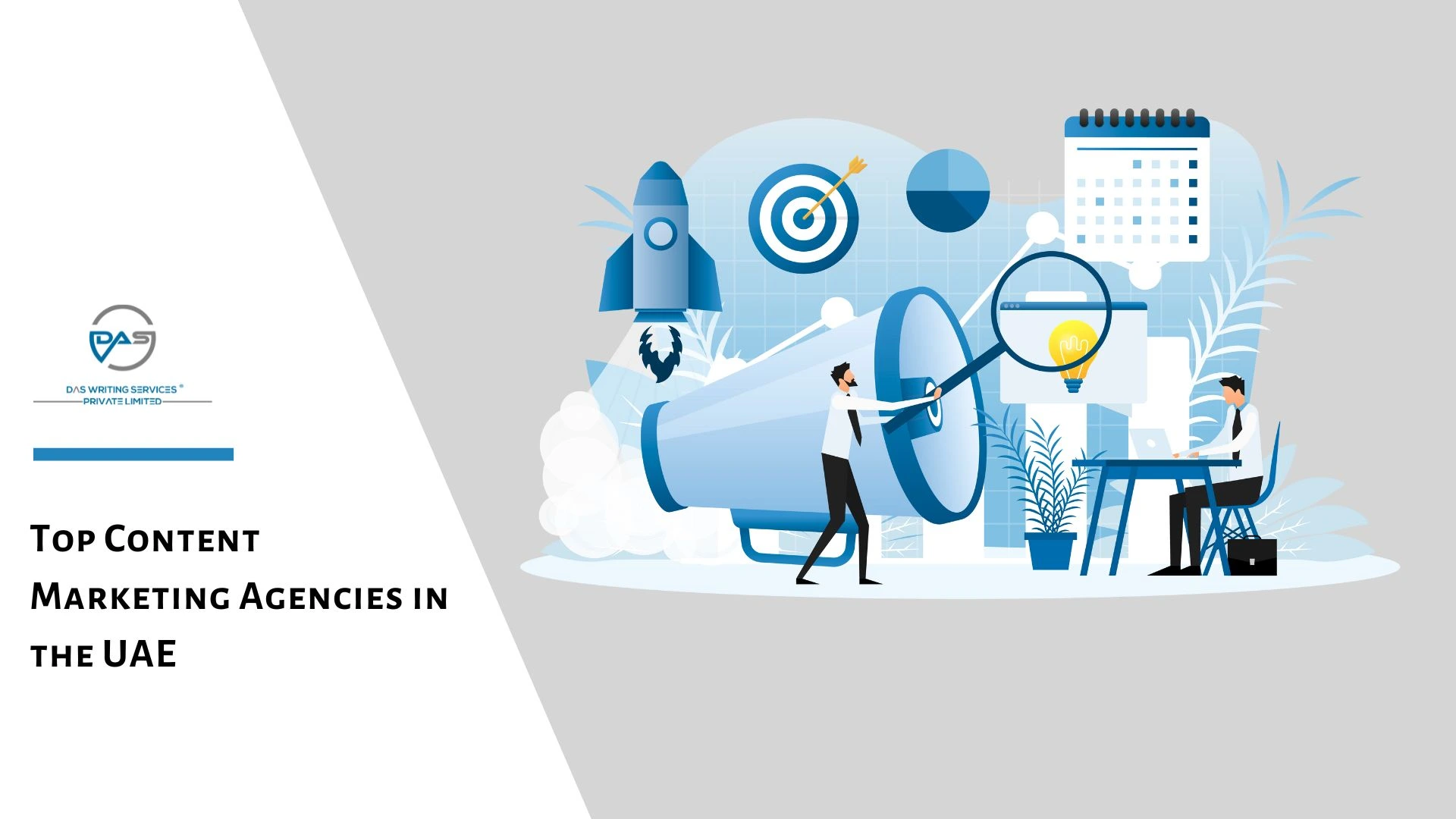Having a strong presence online is arguably the most important factor today. From offering a virtual platform to connect with people, today the internet shapes and influences public opinion like nothing else.
That explains why most established businesses turn to the internet for marketing. Especially with the many benefits of digital marketing, the practice has emerged as the cornerstone of modern business strategies.
Offering a plethora of advantages, online marketing campaigns accelerate the growth of a business to create a robust online presence, get customers and many more!
So, keep reading to learn more about the advantages of digital marketing.
What is Digital Marketing?
Digital marketing refers to a range of online strategies to promote a brand’s products and services through internet channels. These channels include websites, search engines, social media platforms, email, and mobile apps.
Digital marketing campaigns use a series of tools like online blog posts, social media marketing, influencer marketing, newsletters, PPC, targeted ads and so on to draw customers.
With its versatile and scalable strategies, it is of little surprise that many brands transitioned to a digital-only marketing strategy. However, its time-consuming nature and potential privacy issues are some of the limitations of digital marketing.
Top 15 Benefits of Digital Marketing
Thanks to the digital revolution, the world has become a global village – more connected than ever before. The power of the internet has allowed marketing professionals to efficiently promote a brand and its products and services to the right audience.

It results in marketers enjoying a whole set of perks and advantages in their online marketing campaigns. The following are some of the potent benefits of digital marketing that you can look out for in your marketing campaigns:
1. Global Reach
The scope or range of digital marketing is virtually limitless. This allows businesses to expand their audience reach beyond local and national boundaries. Different types of digital marketing allow access to multiple channels and platforms that have virtually global reach. From social media marketing, to search engine marketing with proper content optimization, businesses can reach audiences across the world with digital marketing. It is one of the advantages of digital marketing.
It enables businesses unparalleled potential to scale and create a robust presence in the industry. In comparison, traditional marketing strategies can be highly expensive when trying to tap into a new area. Also, running long-term campaigns with traditional methods turns out to be extremely resource-intensive which ends up creating a lot of pressure.
2. Precise Audience Targeting
One of the key benefits of digital marketing for businesses is the ability to target specific demographics and audiences that are genuinely interested in the products and services.
Social media ad campaigns, influencer marketing and SEM (search engine marketing) allow businesses to reach audiences with targeted keywords.
Coupled with effective content management that efficiently addresses the pain points of the audience, digital marketing gives seamless opportunity. Tools like Google Ads further contribute to this process whereby businesses can tailor their marketing tactics to resonate with the right audience, increasing the potential for conversions.
3. Qualified Leads
High quality content is one of the cornerstones to get the benefits of digital marketing campaign. Because apart from engaging the existing customers, value driven content tends to attract new audience that are genuinely interested in your product and services.
As a result, content marketing and email campaigns produce more effective and conversion-ready leads. With precise content and reinforced communication digital marketing has become the default tool for conversions.
In comparison, a lot of traditional marketing strategies involve a hit-or-miss approach where many leads turn out to be cold and ineffective.
4. Higher Return on Investments
As discussed in the previous point, benefits of digital marketing include targeting just the right audience. This ensures consistent and effective messaging that strikes the right chord to ensure higher returns on investments.
Compared to the traditional marketing method, the digital strategy allows customization as per the needs and requirements of the audience. With its ability to track and measure results in real-time, businesses can optimize their campaigns for maximum effectiveness, thereby maximizing their ROI.
5. Quantifiable Results
Unlike conventional marketing practices, where gauging success can be challenging, digital marketing benefits from comprehensive analytics and reporting tools. The market is filled with a wide range of tools like Google Analytics, Ads, Semrush, and Meta Business Suite which can produce highly accurate data as to the effectiveness of your promotional campaign.
With the complete suite of tools, businesses can track metrics such as website traffic, engagement rates, conversion rates, and more. This allows companies to track the effectiveness as well as to identify the pitfalls of their campaigns.
6. Cost-Effective Solutions
One of the benefits of Digital marketing often requires a lower investment compared to orthodox channels like print or television advertising. With a host of strategies like organic search traffic optimization, local SEO, social media, and email marketing, much of the digital marketing measures are essentially free of cost.
And of course, measures like PPC and Google Ads also turn out to be cost-effective as it utilizes a results driven approach. As per the strategy, you pay only for the amount of results that you receive.
This makes digital a cost-effective option for businesses of all sizes, especially startups and small businesses with limited budgets.
7. Better Customer Engagement
Through social media, email marketing, and interactive content, benefits of digital marketing enables meaningful engagement with customers.
With helpful content that addresses the pain points of the customers and solves their problems, businesses can actually get closer to their customers and engage them by showcasing an empathetic voice.
This two-way communication not only builds brand loyalty but also provides valuable insights into customer preferences and behaviours.
8. Increased Brand Awareness
Strategies like search engine optimization (SEO) and content marketing help boost the value of your brand. By targeting the right set of keywords effective for the niche of audience, companies can ensure the repeated appearance of their brand name to the target group.
This ensures renewed awareness about the brand to the target group. By using various channels, digital marketing produces holistic results that keep your brand name and value fresh and relevant.
9. Increased Sales
By optimizing conversion funnels and implementing persuasive call-to-actions (CTAs), digital marketing drives sales and revenue growth. This underlines the importance of online marketing.
E-commerce platforms, in particular, benefit from digital marketing strategies that streamline the purchasing process and encourage people to take immediate action with exciting offers.
10. Create a Niche in the Industry
To survive in a competitive business landscape having a robust and distinguished position in the market is essential. Whether it is through value-driven blog posts or informational guides on a topic – helpful content is the cornerstone to stand out from your competitors in the business.
Benefits of digital marketing allow businesses to carve out a unique niche in their industry by targeting specific market segments or addressing niche interests. This differentiation sets them apart from competitors and establishes them as industry leaders.
11. Efficient Local Reach
From finding local grocery stores to getting the contact details of the carpenters near you, people often rely on Google to find local businesses. That explains why local searches constitute 46% of total Google searches.
One of the much-coveted benefits of digital marketing is its ability to customize messaging to target people from a specific location and area. With effective targeting, localized digital marketing operations help produce better conversions.
For businesses targeting local customers, digital marketing offers highly efficient and targeted strategies. Local SEO, online directories, and geo-targeted advertising help businesses connect with customers in their locality, driving foot traffic and assured sales.
12. Data-Driven Campaign Management
One of the key advantages of running a digital marketing campaign is the ability to track the performance of your marketing strategy. With a series of tools available at your disposal, marketers can harness its potential to judge the utility of a campaign.
With periodic reports and data tracking, business owners can make informed decisions about the effectiveness of a digital marketing campaign. By analyzing user behaviour, preferences, and demographics, businesses can refine their strategies and allocate resources more effectively.
13. Flexible & Versatile Strategies
Unlike traditional marketing, digital marketing allows for rapid iteration and adaptation of strategies based on real-time feedback. As mentioned before, it allows the adoption of data-driven policies.
Further, strategies like A/B testing help run multiple versions of the same offers and promotions to judge user’s reactions and responses. This flexibility enables businesses to stay agile in response to changing market dynamics and consumer trends.
14. Create Loyal Customers
Marketing is not only about closing sales. The primary aim of marketing is establishing a connection between a business and its customers. The same is achievable more efficiently through content-driven digital marketing strategies.
By delivering personalized experiences and consistent messaging across digital channels, businesses can cultivate long-term relationships with customers. Loyalty programs, targeted promotions, and exceptional customer service further enhance customer loyalty and retention.
15. Accurate Buyer Personas
Through data collection and analysis, benefits of digital marketing allow businesses develop accurate buyer personas – detailed profiles of their target audience. This facilitates an in-depth understanding of the customers and their likes and dislikes.
Understanding customer demographics, preferences, and pain points allows a business a competitive advantage over others. Not only does it create a stronger bond with the target group but also lets a brand dominate the market with customized strategies. This enables businesses to tailor their marketing efforts for maximum impact.
Types of Digital Marketing
Here are the types of digital marketing you can choose from:
Search Engine Marketing (SEM)
Search Engine Marketing (SEM) is distinct from SEO, as it focuses primarily on paid advertising that appears in search engine results pages (SERPs). These advertisements, often displayed at the top or side of the SERP, are triggered by specific search terms entered by users. Advertisers incur costs each time someone clicks on their ad. The leading platforms for SEM are Google Ads and Bing Ads.
The effectiveness of SEM is underscored by the fact that 68% of online interactions begin with either organic or paid search results. By positioning your brand prominently where most online activities start, you can effectively draw in more potential customers to your website.
Social Media Marketing
Social media marketing focuses on organically promoting your business across various social platforms. It’s not merely a channel for advertising; it also enables direct, one-on-one interactions with your most engaged followers, enhancing customer relationships.
Given the pervasive nature of social media, businesses need to maintain an active presence on multiple platforms. Currently, Facebook, X, YouTube, Instagram and TikTok dominate the landscape. However, successful social media marketing requires more than just setting up a few accounts.
Many platforms offer features that let users make purchases directly through the app. While driving sales is important, the primary objective for many companies is to foster conversations with their audience. Additionally, social media serves as an excellent avenue for amplifying your content marketing efforts.
To enhance your social media reach and effectiveness, consider these best practices:
- Understand Your Audience: Identify their preferred platforms and interests.
- Create Compelling Content: Focus on producing high-quality and engaging posts.
- Timely Engagement: Aim to respond to comments and inquiries within 24 hours.
- Maintain Consistency: Stick to a regular posting schedule to keep your audience engaged.
- Optimise Posting Times: Share content when your target audience is most active.
- Consider Professional Help: Hiring a social media manager can streamline your campaigns.
Ultimately, the goal of social media marketing is to foster engagement with your followers. The more you inspire interaction with your content, the greater the likelihood that your audience will share it, potentially attracting new customers in the process.
Pay Per Click (PPC)
Pay-per-click (PPC) advertising is a digital marketing strategy where advertisers pay a fee each time their ad is clicked. This model ensures that businesses only incur costs when users engage with their ads, making it distinct from other advertising methods that may charge based on impressions. PPC can be utilized on both search engines and social media platforms, providing flexibility in reaching audiences.
Google Ads stands out as the leading PPC platform for search engine advertising, while Bing Ads follows as a popular alternative. Additionally, platforms like Facebook Ads, YouTube Ads, and Amazon Ads offer valuable opportunities for PPC campaigns.
To maximize the effectiveness of your PPC efforts, it’s essential to optimize your campaigns. Here are some key strategies:
- Enhance Ad Quality: Focus on improving your Quality Score in Google Ads to boost ad performance.
- Satisfy Target Audience’s Needs: Craft ads that address the specific challenges or interests of your target audience.
- Landing Page Optimization: Ensure your landing pages are high-quality and relevant to the ads.
- Smart Bidding: Employ bidding strategies that balance cost effectively—aiming neither too high nor too low.
While PPC can deliver quick results, it also comes with potential challenges. Costs can fluctuate significantly, and without a well-structured plan, expenses can escalate quickly. It’s crucial to understand the intricacies of bidding on your chosen PPC platform and to monitor relevant metrics to assess return on investment (ROI).
Affiliate Marketing
Affiliate marketing is a promotional approach that involves partnering with affiliates who advocate for a business’s products or services to their audience. When a sale occurs through an affiliate’s referral, they receive either a commission based on a percentage of the sale or a fixed fee. While it shares similarities with influencer marketing, the key distinction is that affiliates only earn compensation when a purchase is made as a result of their promotion.
This strategy leverages the established credibility and reach of affiliates, who already have connections with your target market. When these affiliates endorse your brand, their audience is more inclined to trust your business due to this existing relationship.
There are various formats within affiliate marketing. Some affiliates may create product reviews or unboxing videos, while others might incorporate your offerings into their content organically.
Affiliates often weave promotions into valuable content, enhancing the likelihood that your target audience will engage with the message. Typically, these affiliates will use a unique code or link provided by you to track their sales effectively.
Native Advertising
Native advertising refers to a form of paid promotion designed to blend seamlessly with the content of the platform where it appears. The primary objective is to create ads that resemble regular content, making them less recognizable as advertisements. By integrating into their surroundings, native ads aim to engage users without drawing attention to their promotional intent.
The rise of native advertising can be attributed to growing scepticism among consumers towards conventional paid ads. Many shoppers perceive these traditional ads as biased and often disregard them, prompting advertisers to seek alternatives that can improve conversion rates.
To counteract consumer scepticism, native ads focus on delivering entertaining or informative content while minimizing their overtly promotional aspects. For instance, a native ad might be crafted to resemble a typical post on social media, or it could take the form of a sponsored article on a news website.
However, creating effective native ads requires a careful balance, as they must still maintain transparency about their advertising nature. To achieve this, native ads typically include disclosures such as “sponsored” or “promoted,” ensuring that users understand they are engaging with paid content. Despite being advertisements, users often respond more favourably to native ads because they feel less disruptive compared to traditional advertising formats.
Email Marketing
Email marketing is a direct marketing strategy that involves communicating with customers through carefully crafted email messages. Despite being over twenty years old, email remains one of the fastest and most effective methods for reaching your audience. To stand out in crowded inboxes, your emails must be engaging, relevant, informative, and entertaining.
There are various types of emails that businesses typically utilize in their marketing efforts, including:
- Blog Subscription Newsletters: Regular updates that share new blog content with subscribers.
- Welcome Emails: Messages sent to greet and onboard new customers.
- Promotional Emails: Special offers or promotions tied to holidays or events.
- Post-Purchase Follow-Ups: Emails that provide customers with tips, tricks, and best practices after making a purchase.
By leveraging these different formats, businesses can effectively connect with their audience and enhance customer engagement.
Marketing Automation
Marketing automation is a digital strategy designed to simplify and enhance marketing processes through automation. Utilizing artificial intelligence (AI) and machine learning (ML) technologies, this approach enables businesses to run their marketing campaigns more efficiently. While it doesn’t replace human involvement, marketing automation takes care of repetitive and routine tasks, allowing marketers to concentrate on strategic planning and creative initiatives.
For small or busy marketing teams, automation tools can significantly reduce the workload by:
- Streamlining various marketing tasks and workflows.
- Tracking and analyzing performance metrics.
- Calculating return on investment (ROI) for campaigns.
- Identifying effective marketing strategies and those that need improvement.
By automating these processes, you can quickly analyze extensive customer data, leveraging insights to develop more targeted and personalized campaigns that enhance conversion rates and drive sales.
Video Marketing
Video marketing is a digital marketing strategy that involves using video content to promote your business, whether through longer or shorter formats. This approach enables you to convey a wealth of information quickly, which is why many platforms support and promote video marketing.
While YouTube is the most well-known platform for video marketing, social media sites like TikTok and Instagram also offer excellent opportunities for showcasing your brand through engaging video content.
Influencer Marketing
Influencer marketing is a digital strategy employed by brands to advertise their products or services through well-known content creators. This approach shares similarities with affiliate marketing, as it allows brands to leverage an influencer’s existing audience, which typically has a built-in trust for the influencer’s recommendations.
Although influencer marketing is often associated with B2C sales of consumer products, it can also be effective for B2B companies offering items like office supplies or software subscriptions. The key is to collaborate with influencers who resonate with your target audience.
Unlike affiliate marketing, influencer marketing typically does not involve sharing profits. Instead, brands usually compensate influencers with a fixed fee for their promotional efforts. This means that influencers receive payment regardless of the sales generated from their endorsements.
Takeaway
If you think about digital marketing vs traditional marketing, digital marketing offers unparalleled advantages. It is comparatively cheaper and allows easy customisation and adaptability as per requirements.
While traditional marketing still has its place, the shift towards digital channels is undeniable in today’s tech-savvy consumer landscape.
The benefits of digital marketing in 2024 are vast and multifaceted and it allows businesses to thrive in an increasingly digitalized world. By leveraging the power of digital channels, businesses can expand their reach, engage with customers, drive sales, and ultimately achieve sustainable growth and success.
Frequently Asked Questions
1. What is the use of digital marketing?
Digital marketing is used to promote products or services through the internet via websites, social media platforms, search engines, email, and mobile apps.
2. How do consumers benefit from digital marketing?
Consumers benefit from digital marketing through personalized experiences, access to relevant information, convenient purchasing options, and engaging interactions with brands.
3. What are the types of digital marketing?
Types of digital marketing include search engine optimization (SEO), social media marketing, content marketing, email marketing, pay-per-click (PPC) advertising, influencer marketing, and affiliate marketing, among others.
4. How important is digital marketing today?
Digital marketing is crucial in today’s digital-centric world as it allows businesses to reach and engage with their target audience effectively, drive sales, and stay competitive in the market.
5. Who uses digital marketing?
Businesses of all sizes and industries use digital marketing to promote their products or services, connect with customers, and achieve their marketing objectives. From startups and small businesses to multinational corporations, digital marketing is a ubiquitous tool in the modern business landscape.
Subhodip Das is the founder and CEO of Das Writing Services Pvt. Ltd. He has an experience of 12 years in the field of Digital Marketing and specialises in Content Writing and Marketing Strategies. He has worked with well-established organisations and startups helping them achieve increased Search Engine Rank visibility. If you want to grow your business online, you can reach out to him here.




Leave a comment
All comments
Aditi Singh
I thought digital marketing was just about social media. This blog opened my eyes to its vast scope, including SEO and email marketing and the many advantages.
Anurag Thakur
This article made it easier to decide on a marketing strategy for my business. Clear and concise explanation of digital marketing's various advantages. The table was a great touch!
OrangeDigiTech
This article on content marketing is fantastic. Your tips are spot-on and easy to implement.
Ankit
Highly insightful blog, recommending everyone to read
Astolfo Ignatov
Thanks for sharing. I read many of your blog posts, cool, your blog is very good.
Arghish Das
Great article! It's really helpful for anyone looking to learn about digital marketing. I especially liked the part about reaching a global audience.
Priyanshi Sathiya
This article does a great job highlighting the key advantages of digital marketing. It's a must-read for businesses aiming to grow their reach and connect with the right audience online.